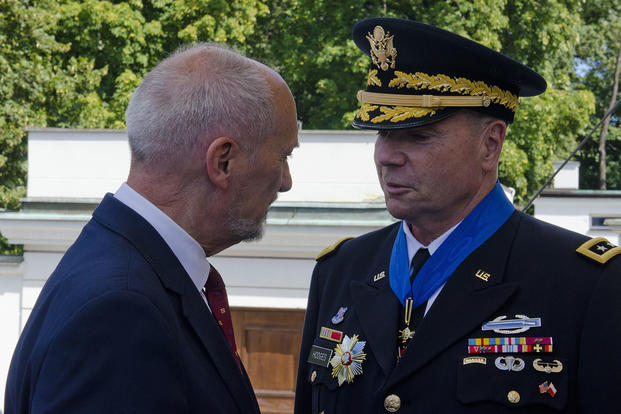The U.S. and its NATO allies simply have to get better field radios and drop their reluctance to share intelligence to meet the Russian threat, the outgoing commander of U.S. Army Europe said Tuesday.
"It's something that has bedeviled me for at least three years," retiring Lt. Gen. Ben Hodges said of the "interoperability" problem in the alliance.
"I continue to be disappointed" by the failure of NATO to come up with a secure radio that will allow U.S. and allied troops in the field to communicate without being jammed, he said. "They cannot talk to each other securely."
The result is that "we are taking a great risk with our ability to be an effective deterrent," Hodges said at the Association of the U.S. Army's annual convention in Washington, D.C.
Related content:
- Army Weapons Tests on the Fly in Effort to Win Race Against Russia
- Army Chief: Modernization Reform Means New Tanks, Aircraft, Weapons
- Next Army Combat Vehicle May Feature Active Protection, Laser Weapons
He also called on the U.S. and its allies to shed some of their traditional reluctance to share secrets in the interests of common defense.
"Our default setting is to protect information," Hodges said, but the failure to share tactical intelligence could hinder NATO's response to a threat.
"We have to be able to move as fast or faster than the Russian forces" to deter aggression, he said.
Hodges made the comments in a panel discussion on land forces in Europe with U.S. Army Lt. Gen. Darryl Williams, commander of NATO's Allied Land Command; Maj. Gen. Jaroslaw Mika, general commander of the Polish Armed Forces; Lt. Gen. Leo Beulen, commander of the Royal Netherlands Army; and Maj. Gen. Karl Engelbrektson, chief of staff of the Swedish Army.
Poland and the Netherlands are NATO members, while Sweden has been a NATO "partner" since joining NATO's Partnership for Peace in 1994.
Extending Interoperability
In his remarks, Poland's Mika echoed Hodges on the need for more interoperability in NATO but said, "We have to extend interoperability beyond the military" to the governments involved.
Engelbrektson said Sweden and NATO had focused since the end of the Cold War on counter-terrorism and "stability operations," and now need to improve at conventional "high-intensity conflict. That is something we have to get good at again."
He joined the rest of the panel in hailing Hodges' efforts to make NATO a more integrated and agile force.
"Everybody knows in my country who Lt. Gen. Ben Hodges is," Engelbrektson said.
Hodges, 59, is expected to retire later this year. In June, the Center for European Policy Analysis (CEPA) announced he will join the nonprofit when he steps down from active duty.
The announcement said Hodges "will contribute to CEPA research and provide military insight on questions of geo-strategy, deterrence, territorial defense and the European military balance."
In what was his last appearance in uniform at an AUSA convention, Hodges mocked Russian claims that its Zapad (West) military exercises last month on NATO's borders involved only 12,700 troops. More than that would require observers under international law.
"There were tens of thousands of Russian soldiers, sailors and airmen involved in this exercise," he said.
The West responded to Zapad with an example of the improved intelligence sharing that he has been looking for, Hodges said.
The intelligence sharing by the allies was "better than we have ever seen because we were all really focused on doing what we could to understand what the Russians were going to be doing," he said.
Multi-National Force in Romania
In the latest move by NATO to counter Russia, the alliance this week began setting up a multi-national force in Romania to offset Moscow's buildup in the Black Sea region.
The plan is to have the force consist mainly of a Romanian brigade of about 4,000 troops, supported by rotating forces from nine other NATO countries and also backed by about 900 U.S. troops already in the area.
"Our purpose is peace, not war," Romanian President Klaus Iohannis told the NATO Parliamentary Assembly meeting in Bucharest on Monday.
"We are not a threat for Russia, but we need dialogue from a strong position of defense and discouragement," Iohannis said.
"We are sending a very clear message: NATO is here, NATO is strong and NATO is united," NATO Secretary General Jens Stoltenberg told the meeting.
"We are implementing the biggest reinforcement to our collective defense since the end of the Cold War," he said. "This includes our four battle groups in the Baltics and Poland, and our forward presence here in the southeast of the alliance."
-- Richard Sisk can be reached at Richard.Sisk@Military.com.































